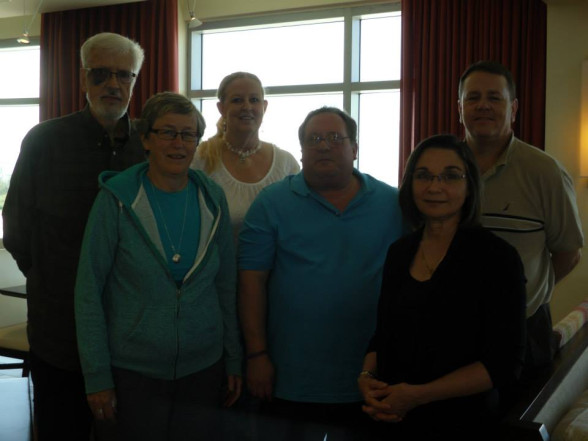This is to be the first of our weekly blog series, highlighting our most recent achievement. After setting up this new advocacy and support group, of, by and for people with dementia, our modest but successful fundraising efforts enabled five Board a members and co-founders to attend ADI2014, the 29th Alzheimer's Disease International conference in San Juan, Puerto Rico.
Alzheimer’s Disease International (ADI) is the international federation of 79 national Alzheimer associations around the world. It was founded in 1984 to help establish and strengthen Alzheimer associations throughout the world, through the exchange of information, skills and models of best practice. ADI wants to improve the quality of life for people with dementia and their families and to raise global awareness about Alzheimer’s disease and all other causes of dementia.
Visiting Puerto Rico was a wonderful experience, with relaxed locals, excellent food and if only we'd had enought time, some wonderful beaches, rain forests and I am sure, lots of dancing! We were lucky as the weather was sunny, and the predicted rain waited for us to depart. Virtually everyone spoke English, definitely making it easy for us, and the final nights food was, according to the restaurant staff, an example of what the locals eat a home. It was delicious!
The theme for this years conference was Dementia: Working together for a global solution. Over the course of three days, members of our group presented a number of times, and I was also involved in the opening and closing ceremonies. Below is a list of the presentations made by members, and as we finalise the editing, video recordings of these presentations will be uploaded to the website.
Richard Taylor: Living Beyond the Stigmas Associated with the Various Forms of Dementia
Kate Swaffer: Non-Pharmacological Interventions: One Patient's Journey
Maggie Weidmark: Challenges To Early Onset Dementia
Sue Stephen: Living with PCA
Janet Pitts: Introducing Dementia Alliance International
Kate Swaffer: Introducing the Alzheimer’s Australia Dementia Advisory Group: Empowering People with Dementia
Selva Marasco: Sanación Y Demencia / Healing And Dementia
Laura Bowley, John Sandblom & Richard Taylor: Internet Support Groups for People with Dementia
Richard Taylor: Alzheimer's From the Inside Out: Living with dementia for 10 years - what I've learned
Kate Swaffer: Prescribed Disengagement, Models of Careand & Quality of Life
Richard Taylor: Responding To The Charge "You Don't Have Dementia, You Are Not Acting The Way I Think People With Dementia Should Act"
This conference gave Dementia Alliance International its first opportunity to announce to the dementia community, in a more tangible way than our global, online presence, just who we are and what we wish to achieve for those we represent, namely, people living with dementia. It also allowed us to meet each other, forging lifelong friendships, and the chance to learn more about each other's professional acuity and backgrounds.
No longer will we accept anything about us without us; no longer will we accept the role of victim of sufferer; no longer will we be seen as fading away; no longer will we accept being called demented. Our family carers supported us, we supported each other, and we learned we can and must stand up and speak out, and more importantly, we empowered many other people with dementia to do the same.
People with dementia, until the late stage, do not need day care or respite, nor do they do not need to accept prescribed disengagement, they need to continue to live meaningful and engaged lives, in the same way as others. It is the power of doing truly meaningful and engaging activities, with like-minded people that offers us real support, not just sitting around in a ‘support group’ discussing our troubles and ruminating over the negative parts of living with dementia or doing activites others choose for us.
We now have a lot of work to do, to embed the groundbreaking work we have just seen culminating in such a public presence, and I believe we will look back at this time as one that will have made history in changing the lives of people with dementia, by people with dementia, and which will be seen as a moment in time from which there was no turning back.
Kate Swaffer, Editor DAI
